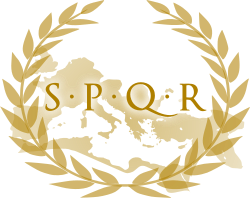
Back Pompeius Afrikaans ፖምፐይ Amharic Gneu Pompeyo Magno AN Gnaeus Pompeius Magnus ANG بومبيوس الكبير Arabic بومبيوس الكبير ARZ Cneu Pompeyu Magnu AST Qney Pompey Azerbaijani Гней Пампей Вялікі Byelorussian Гнэй Пампэй BE-X-OLD
Pompey | |
|---|---|
Gnaeus Pompeius Magnus | |
 Bust of Pompey, copy of an original from 70–60 BC, Venice National Archaeological Museum | |
| Born | 29 September 106 BC Picenum, Italy |
| Died | 28 September 48 BC (aged 57) Pelusium, Egypt |
| Cause of death | Assassination |
| Resting place | Albanum, Italy |
| Occupations |
|
| Office | Consul (70, 55, 52 BC) |
| Spouses |
|
| Children | |
| Father | Gnaeus Pompeius Strabo |
| Relatives | Pompeia gens |
| Military career | |
| Battles / wars | |
| Awards | 3 Triumphs |
 |
| Part of a series on |
| Ancient Rome and the fall of the Republic |
|---|
|
People
Events
Places |
Gnaeus Pompeius Magnus (Latin: [ˈgnae̯ʊs pɔmˈpɛjjʊs ˈmaŋnʊs]; 29 September 106 BC – 28 September 48 BC), known in English as Pompey (/ˈpɒmpi/ POM-pee) or Pompey the Great, was a Roman general and statesman who was prominent in the last decades of the Roman Republic. As a young man, he was a partisan and protégé of the dictator Sulla, after whose death he achieved much military and political success himself. He was an ally and a rival of Julius Caesar, and died in civil war with him.
A member of the senatorial nobility, Pompey entered into a military career while still young. He rose to prominence serving Sulla as a commander in the civil war of 83–81 BC. Pompey's success as a general while young enabled him to advance directly to his first consulship without following the traditional cursus honorum (the required steps to advance in a political career). He was elected as consul on three occasions (70, 55, 52 BC). He celebrated three triumphs, served as a commander in the Sertorian War, the Third Servile War, the Third Mithridatic War, and in various other military campaigns. Pompey's early success led dictator Sulla to give him the cognomen Magnus – "the Great" – after his boyhood hero Alexander the Great. His adversaries gave him the nickname adulescentulus carnifex ("teenage butcher") for his ruthlessness.[1]
In 60 BC, Pompey joined Crassus and Caesar in the informal political alliance known as the First Triumvirate, cemented by Pompey's marriage with Caesar's daughter, Julia. After the deaths of Julia and Crassus (in 54 and 53 BC), Pompey switched to the political faction known as the optimates—a conservative faction of the Roman Senate. Pompey and Caesar then began contending for leadership of the Roman state in its entirety, eventually leading to Caesar's civil war. Pompey was defeated at the Battle of Pharsalus in 48 BC, and he sought refuge in Ptolemaic Egypt, where he was assassinated by the courtiers of Ptolemy XIII.
- ^ Leach 1978, p. 29.